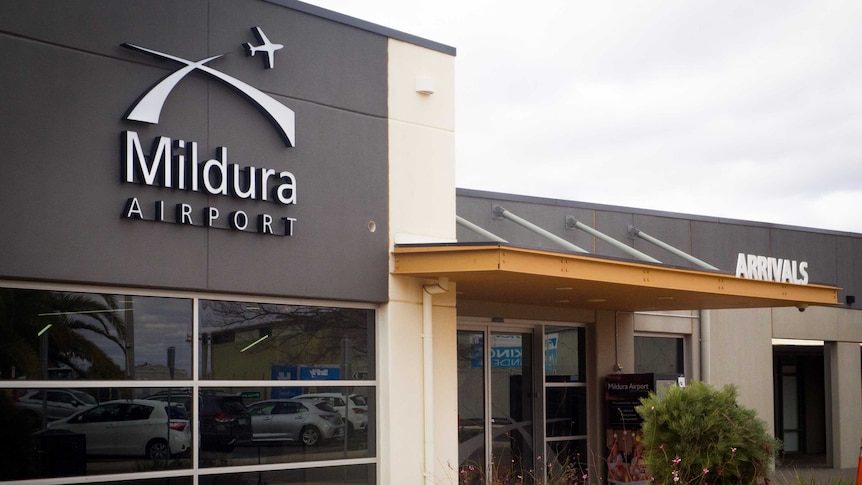Mildura Airport bosses have revealed a new multi-million-dollar navigation system will only be used “a maximum of two or three times” per year outside of training purposes.
Key points:
- A $4 million instrument landing system began to be installed at Mildura Airport last year
- Airport CEO Trevor Willcock says it will improve safety, but it will only be used a few times a year outside of training
- The ILS was funded by the federal government, Mildura Airport, and council
The $4 million category 1 instrument landing system (ILS) began to be installed at the airport last year with a promise that it would reduce flight delays caused by fog and low visibility.
It was funded by the federal government, local council, and the airport, and is expected to be operational by early next year.
loading
Airport chief executive Trevor Willcock said the system was installed primarily for safety to help land planes when visibility is low, but he said this may only occur “a maximum two or three times per annum.”
“But there’s no price you can put on safety,” he said.
“We at all times want this to be the safest airport possible.”
foggy rationale
In July, a QantasLink plane arriving from Melbourne was forced to fly west of Mildura for 40 minutes before flying back to Tullamarine airport due to foggy conditions.
Passengers were stuck on the flight for more than three hours.
Mr Willcock said it was “very hard to say” if the system would have helped in that instance because fog changes quickly in depth and density.
“But that’s what the ILS is for, so we have to assume that they would have been able to land [if the ILS was operational],” he said.
“Most airports in the world have [an ILS] so they certainly do enhance the ability to land in poor weather conditions.”
Maintenance and testing of the ILS is also expected to cost the airport more than $100,000 per year.
Pilot says system won’t work
However, Mildura-based airline captain Andrew Carrigan, who has more than 20 years of experience flying regional airliners, said the ILS would not have made a difference in July.
“It really annoys me that they are putting it out there as a safety thing, it’s not really,” he said.
“It won’t allow us to land in fog.”
Mr Carrigan said to legally land an airplane with the assistance of an ILS in Mildura, visibility would need to be at least 1,500 meters.
“I was supposed to work that day so I was monitoring the automatic weather service,” he said.
“The fog was ranging from 300-900 meters for most of the day, with the occasional foray to around 1.2 kilometers or 1.3km.
“But they were very narrow windows. So the chances of plans getting in on that morning were minor.
“You would have to be extremely lucky to get a five or 10-minute window where the visibility would get close to a level where you could land.”
Mr Carrigan said in addition to a category 1 ILS larger airports like Sydney Airport also had high-intensity approach and runway lighting which allow pilots to land with a minimum visibility of 800 metres.
He said without the lighting the ILS would make minimal difference to passenger planes in Mildura.
“What I’m scared of is when [the ILS is] operational and we aren’t able to land in fog. People are going to ask, ‘Why not when we were told it would allow that?'”
Mr Carrigan said these were his personal views and not the view of his employer.
Nothing to do with flying school
Mr Willcock said a secondary reason the ILS was installed was to help flying school students train in Mildura.
To receive a commercial pilot’s license students are required to have experience using an ILS.
Mr Willcock said nine flying schools were within range of the airport and could use the ILS for training purposes, with a booking system and strict restrictions on what times it could be used.
Chinese-owned company International Aviation Alliance also started training pilots at Mildura Airport in 2019 under a 10-year tenancy agreement.
However, Alliance CEO Simon Clemence said the ILS would be of minimal benefit to its flying school.
He said students were required to undertake “long navigation” flights which they would combine with ILS training at airports in Melbourne or Adelaide.
“It has absolutely nothing to do with the flying school,” he said.
Worth the funding, MP says
The ILS first received funding from the federal government in April 2019, 21 days before a federal election.
Mildura Rural City Council committed $1 million in June 2020 and the airport also contributed $1 million.
Nationals Mallee MP Anne Webster said Mildura Airport deserved the same safety standards as other airports and even if it was used only once a year the ILS was worth funding.
.
